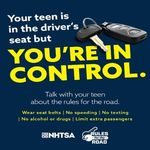
The perfect opportunity to talk with teens about safe driving habits is this week during National Teen Driver Safety Week, which spans from Sunday, October 17 through Saturday, October 23. This year, the U.S. Department of Transportation’s National Highway Traffic Safety Administration (NHTSA) and The Governor’s Office of Highway Safety (GOHS) are teaming up with Sandersville Police Department (SPD) to help empower parents to discuss the importance of driving safety with their young drivers. Parents of teen drivers can partner to support each other through this period of life. Don’t hand over the keys until the teen knows the “Rules for the Road.”
Motor vehicle crashes are a leading cause of death for teens in the United States. There were 6,454 people killed in crashes involving a teen passenger vehicle driver (15 – 24 years old) last year, including 242 people killed in the state of Georgia alone.
“Parents play a critical role in teen driver safety. Their ability to consistently communicate important driving safety information is important,” said Captain Kelly Collins of the Sandersville Police Department. “New teen drivers are still gaining experience behind the wheel, which increases the chance of dangerous situations for the teen and others around them. This is why it’s so important for parents to have these discussions with their teens.”
The NHTSA offers parents and caregivers helpful tips and a framework for having discussions with their teen drivers about risky driving behaviors that can lead to fatal consequences. By sharing their driving experience, parents can help teen drivers make smart choices and actions to stay safe on the road.
1.) Impaired Driving: All teens are too young to legally buy, possess, or consume alcohol. Alcohol isn’t the only substance that can keep teens from driving safely, though, as marijuana can also affect a driver’s ability to react to their surroundings. Driving is a complex task and marijuana slows the reaction time. Remind teens that driving under the influence of any impairing substance – including illicit or prescription drugs, or over-the-counter medication – can have deadly consequences. Let teens know this behavior will not be tolerated.
2.) Seat Belt Safety: Wearing a seat belt is one of the simplest ways for teens to stay safe in a vehicle, yet too many teens are not buckling up. Teen drivers and passengers are more likely to die in a crash if they are unbuckled (nine out of 10 of the passengers who died in 2020 were also unbuckled). Empower teens to stand strong and confirm everyone is buckled up – including front seat and back seat passengers – before the vehicle moves. Reward teens with driving privileges for buckling up every trip, every time, and requiring their passengers to do the same.
3.) Distracted Driving: Cell phone use while driving is more than just risky – it can be deadly. Texting while driving is outlawed in 47 states, Washington D.C., Puerto Rico, Guam, and the U.S. Virgin Islands. Remind teens about the dangers of using a phone while driving and clarify that any phone use (texting, talking, or using any social media apps) is unacceptable. Even if they are stopped at a light, remind teens that posting on social media while driving is unacceptable and distracted driving is not limited to just cell phone use. Other passengers, audio and climate controls in the vehicle, eating, or drinking while driving are all examples of dangerous distractions for teen drivers. Remind teens that headphones are not appropriate to wear while driving a vehicle. All drivers need to be able to hear another vehicle’s horn or the siren from an emergency vehicle, so they can safely move over and out of the path.
4.) Speed Limits: Speeding is a critical issue for all drivers, especially for teens who are less experienced. Males were more likely to be involved in fatal speeding-related crashes than females. Remind teens to always drive within the speed limit.
5.) Passengers: Additional riders in a teen’s vehicle can lead to disastrous consequences. Research shows the risk of a fatal crash dramatically increases in direct relation to the number of passengers in a vehicle. The likelihood of teen drivers engaging in risky behavior triples when traveling with multiple passengers.
Parents can help protect their teen drivers by discussing risky driving behaviors. Self-reported surveys show that teens whose parents set firm rules for driving typically engaged in less risky driving behaviors and were involved in fewer crashes.
Teens need to understand the rules and any other restrictions outlined in Georgia’s graduated driver licensing (GDL) law and the deadly consequences that could occur with dangerous driving. By knowing and enforcing the laws, the teen driver’s safety and that of others on the road is improved.
“Teens will learn much of this content in driver education, but it’s their home environment that drives the lessons home and gets the rules to stick. Parents should set these rules before handing over the car keys,” said Capt. Collins. “We hope parents will start the conversation about safe driving during National Teen Driver Safety Week then keep the conversations going – every day throughout the year – to help keep their teens safer behind the wheel.”



